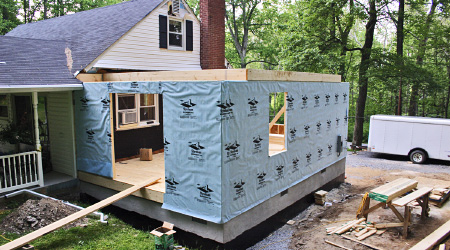Should I Build An Addition Or Buy A New House?

Inevitably a family will outgrow their current accommodations and look at various solutions to provide enough room for all members. As children grow, room becomes more limited and many families will look to increase the amount of available living space by either building an addition or moving into a new residence. There are many factors to evaluate prior to making this type of costly and stressful decision.
Build an Addition
The first option normally considered is to build an addition onto an existing structure which accomplishes two goals. It prevents having to uproot the entire family and either temporarily live in an apartment or lease a house. It also, in certain circumstances, may be less costly to build an addition instead of purchasing a new home. Even these two conditions require extensive analysis because nothing is ever as black and white especially when it comes to your families' happiness.
It's very possible that it took a number of years to find the current home where your family now resides. Many home buyers have an extensive list of what they want in a home and once they find it are reticent to start looking again. An existing structure may accommodate an addition if it is laid out correctly and can be integrated into the property and neighborhood. If building an addition makes sense for the current structure and lot, it still has to be determined if it makes sense financially.
Additions cost on average anywhere from $40,000-$60,000 depending on square footage, materials and the difficulty of integration into the existing structure. This cost can obviously be significantly higher depending on high-end touches like marble countertops and radiant floor heating. If the addition is paid for in cash, which often is not the case, then financial considerations may not be an issue. If it is financed using a home equity line of credit or other construction related loan then the amount of the addition plus the existing mortgage may be as much as a mortgage on a new home. This financial analysis is integral to the decision-making process.
Buy a New House
Purchasing a home is a long-term endeavor on an order of decades which provides roots and security for growing families. But buying a first home doesn't always satisfy these needs and it is common for families to move for multiple reasons not specifically related to needing increased living space. Changing jobs, enrolling in school, neighborhood decline, traffic problems, adding a swimming pool and a plethora of other factors may play a part in the decision to buy a new house. Increasing square footage may simply be the catalyst which gets things started.
If the existing residence is an older home, then increasing available living space by purchasing a new home may be more time and cost effective. This is primarily due to unexpected structural issues which are often discovered during extensive remodeling projects or additions. As any viewer of the show This Old House is well aware, many expensive surprises pop up when building additions onto an existing home. Consider this in your budget and expect 25% more in additional expense when going the addition route. This of course can be avoided by buying a new house.
Another key factor when deciding to build an addition or buy a new house is the current state of the housing market. How many homes are available? What are the prices of new home construction? How much money will you spend in moving and closing costs? What is the level of stress associated with buying a home compared to building an addition? What is the likelihood of staying for an extended period of time in a new home? An addition may be preferable since families can continue to live in function in a space they are already familiar with where a new home would require an extended period of adjustment.
Elsewhere on StockMonkeys.com







